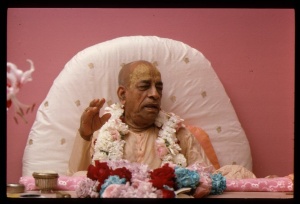SB 8.7.20: Difference between revisions
m (1 revision(s)) |
(Vanibot #0018 edit: make synonym terms in Sanskrit italic in SB - Vanisource) |
||
| Line 1: | Line 1: | ||
{{info | {{info | ||
|speaker= | |speaker=Śukadeva Gosvāmī | ||
|listener=King | |listener=King Parīkṣit | ||
}} | }} | ||
[[Category:Srimad-Bhagavatam - Canto 08 Chapter 07]] | |||
[[Category:Bhagavatam Verses Spoken by Sukadeva Gosvami - Vanisource|080720]] | |||
<div style="float:left">'''[[Srimad-Bhagavatam]] - [[SB 8|Eighth Canto]] - [[SB 8.7: Lord Siva Saves the Universe by Drinking Poison|Chapter 7: Lord Śiva Saves the Universe by Drinking Poison]]'''</div> | |||
<div style="float:right">[[File:Go-previous.png|link=SB 8.7.19]] '''[[SB 8.7.19]] - [[SB 8.7.21]]''' [[File:Go-next.png|link=SB 8.7.21]]</div> | |||
{{RandomImage}} | |||
==== TEXT 20 ==== | ==== TEXT 20 ==== | ||
<div | <div class="verse"> | ||
vilokya taṁ deva-varaṁ tri-lokyā | :vilokya taṁ deva-varaṁ tri-lokyā | ||
bhavāya devyābhimataṁ munīnām | :bhavāya devyābhimataṁ munīnām | ||
āsīnam adrāv apavarga-hetos | :āsīnam adrāv apavarga-hetos | ||
tapo juṣāṇaṁ stutibhiḥ praṇemuḥ | :tapo juṣāṇaṁ stutibhiḥ praṇemuḥ | ||
</div> | </div> | ||
| Line 17: | Line 22: | ||
==== SYNONYMS ==== | ==== SYNONYMS ==== | ||
<div | <div class="synonyms"> | ||
''vilokya''—observing; ''tam''—him; ''deva-varam''—the best of the demigods; ''tri-lokyāḥ''—of the three worlds; ''bhavāya''—for the flourishing; ''devyā''—with his wife, Bhavānī; ''abhimatam''—accepted by; ''munīnām''—great saintly persons; ''āsīnam''—sitting together; ''adrau''—from the top of Kailāsa Hill; ''apavarga-hetoḥ''—desiring liberation; ''tapaḥ''—in austerity; ''juṣāṇam''—being served by them; ''stutibhiḥ''—by prayers; ''praṇemuḥ''—offered their respectful obeisances. | |||
</div> | </div> | ||
| Line 24: | Line 29: | ||
==== TRANSLATION ==== | ==== TRANSLATION ==== | ||
<div | <div class="translation"> | ||
The demigods observed Lord Śiva sitting on the summit of Kailāsa Hill with his wife, Bhavānī, for the auspicious development of the three worlds. He was being worshiped by great saintly persons desiring liberation. The demigods offered him their obeisances and prayers with great respect. | The demigods observed Lord Śiva sitting on the summit of Kailāsa Hill with his wife, Bhavānī, for the auspicious development of the three worlds. He was being worshiped by great saintly persons desiring liberation. The demigods offered him their obeisances and prayers with great respect. | ||
</div> | </div> | ||
__NOTOC__ | |||
<div style="float:right; clear:both;">[[File:Go-previous.png|link=SB 8.7.19]] '''[[SB 8.7.19]] - [[SB 8.7.21]]''' [[File:Go-next.png|link=SB 8.7.21]]</div> | |||
__NOTOC__ | |||
__NOEDITSECTION__ | |||
Revision as of 06:42, 1 December 2017

A.C. Bhaktivedanta Swami Prabhupada
TEXT 20
- vilokya taṁ deva-varaṁ tri-lokyā
- bhavāya devyābhimataṁ munīnām
- āsīnam adrāv apavarga-hetos
- tapo juṣāṇaṁ stutibhiḥ praṇemuḥ
SYNONYMS
vilokya—observing; tam—him; deva-varam—the best of the demigods; tri-lokyāḥ—of the three worlds; bhavāya—for the flourishing; devyā—with his wife, Bhavānī; abhimatam—accepted by; munīnām—great saintly persons; āsīnam—sitting together; adrau—from the top of Kailāsa Hill; apavarga-hetoḥ—desiring liberation; tapaḥ—in austerity; juṣāṇam—being served by them; stutibhiḥ—by prayers; praṇemuḥ—offered their respectful obeisances.
TRANSLATION
The demigods observed Lord Śiva sitting on the summit of Kailāsa Hill with his wife, Bhavānī, for the auspicious development of the three worlds. He was being worshiped by great saintly persons desiring liberation. The demigods offered him their obeisances and prayers with great respect.